The term “fairer” and the phrase “more fair” are seemingly quite consistent in meaning. This often causes some folks to wonder if they are able to be used interchangeably in writing or speech. In this article, we will take a closer look at this term and phrase, and their meanings.
Which Is Correct: More Fair or Fairer?
Both the phrase “more fair” and the term “fairer” are correct. However, they cannot be used interchangeably as some people may assume. The specific use or correct form is dependent on the objective of your sentence and what you are trying to claim, portray, etc.
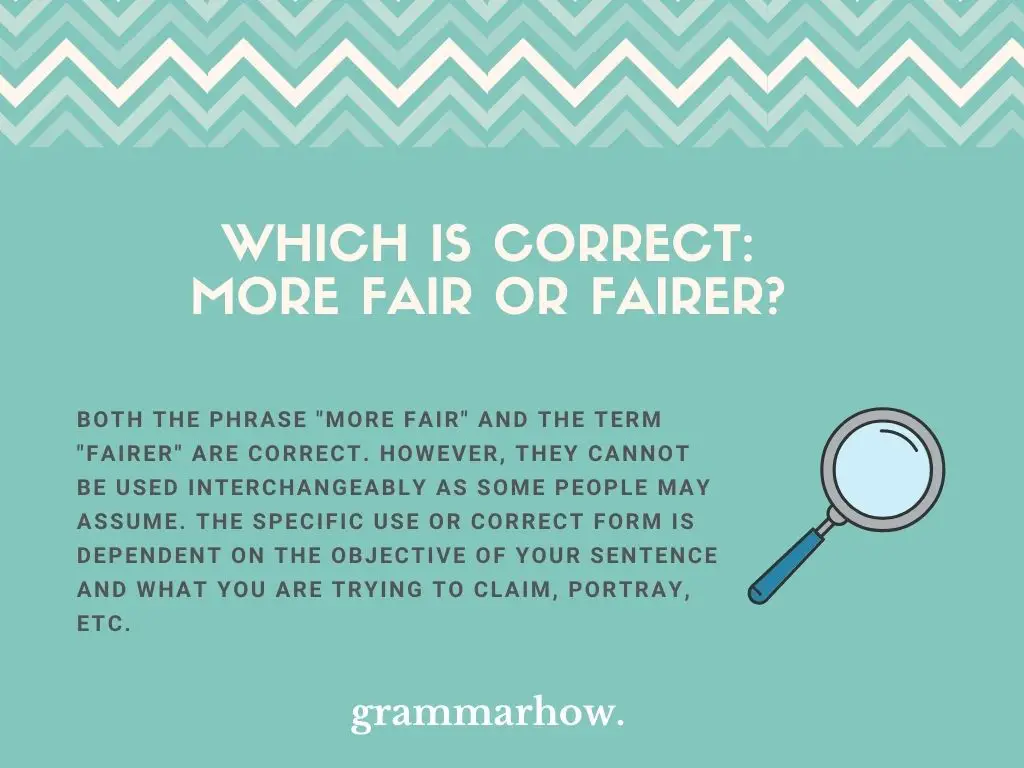
When Should I Use “Fairer”?
There are multiple circumstances when we would choose to use “fairer”. If we are comparing a noun (person, place, thing, or idea) to another noun or group of nouns, then we would follow the usual rules for turning a one-syllable adjective into its comparative and superlative terms by using “fairer”.
Similarly, if we are comparing a noun to itself by its characteristics at a different point in time or space, then we would also choose to use “fairer”.
We would also use “fairer” if we are using “fair” as an adverb. This isn’t a common occurrence, but when it does happen, single-syllable adverbs with identical adjective counterparts follow the usual rules for forming comparatives and superlatives by using the ending(s) “er” or “est”, i.e.: “fairer” or “fairest”.
We can now look over the following examples that highlight the different uses of the term “fairer” in a sentence:
Comparing a noun to other nouns:
- My sister’s hair is much fairer than my colour of hair.
- His mother might be fairer to him than his father will be.
- The weather is fairer in Toronto than it is in my hometown.
Comparing a noun to itself in a different timeframe:
- My hair was fairer as a child than it is now.
- The teacher is much fairer now than she was when she first started her profession.
- The weather is fairer in July than it is in January.
When using “fair as an adverb:
- You may play fair, but I play fairer.
- You were trying to be fair, but I was still being fairer.
When Should I Use “More Fair”?
We will choose to use the phrase “more fair” when we are comparing characteristics or qualities within a single noun. We will also use “more fair” when we are utilizing the term “more” as a determiner, to express or mean a greater number or amount.
We can look over these various examples to help clarify when it is appropriate to use “more fair”:
Comparing characteristics or qualities within a noun:
- You should be aware that the judge is more fair than biased.
- You should know that the teacher is more fair than cruel.
When using “more” as a determiner:
- We found many more fair test results.
- I wish I could have more fair hair than I do.
Is “More Fair” Or “Fairer” Used The Most?
When looking at the data that’s provided by Google Ngram Viewer, we can see that the term “fairer” is used far more often than the phrase “more fair”. This is more than likely due to the fact that “fairer” has more applicable and proper uses that that “more fair”.
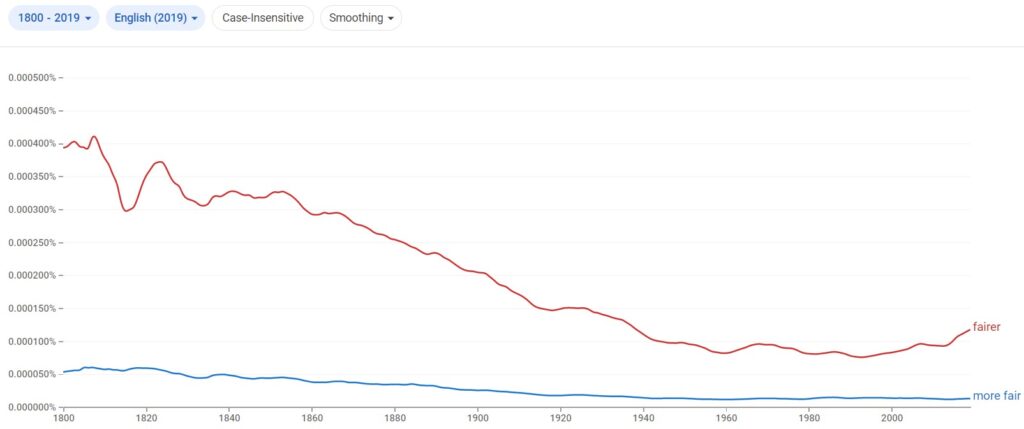
At the same time, the phrase “more fair” is often viewed as being improper or informal because many people will misuse it in place of “fairer”. If the proper use of the phrase is unknown to someone, then they will generally choose to use “fairer” instead.
Are “More Fair” And “Fairer” Used Differently In The US And The UK?
The difference in use between “more fair” and “fairer” is quite consistent in both America and Britain, as highlighted by UK Google Ngram Viewer and US Google Ngram Viewer. It’s shown that the phrase “more fair” has far less use than the term “fairer”, in both parts of the world.
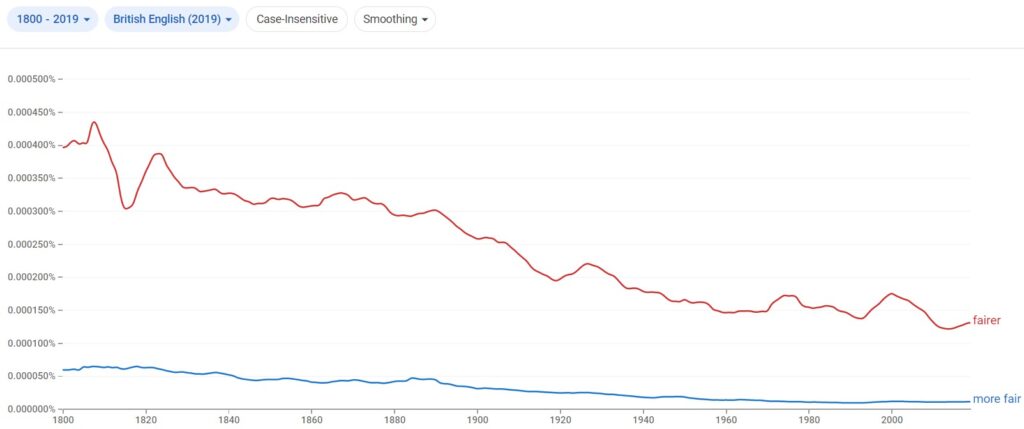
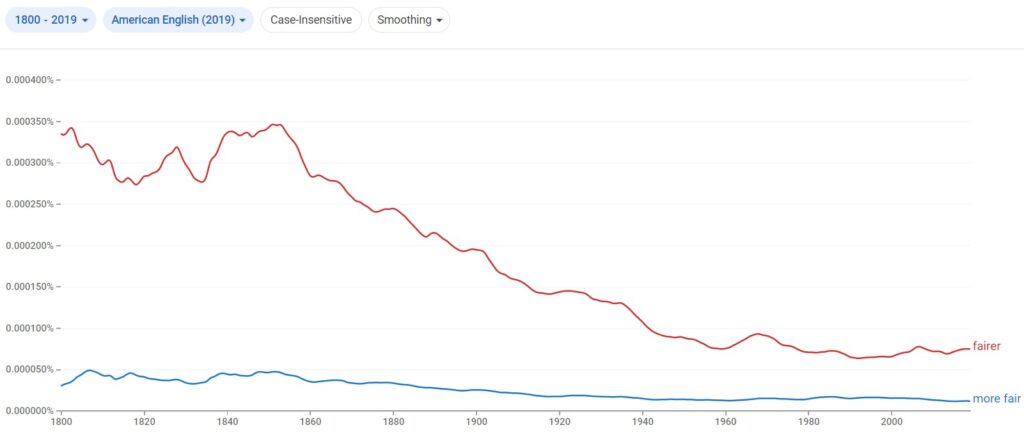
It is worth noting that while “more fair” has never been popularly used in either country, the term “fairer” was much more popular prior to the 1900s. In the 1800s, the use of the term “fairer” was far more common in both the US and the UK. This may be because the terms “fair” or “fairest” are more often utilized.
Is It “Fairest” Or “Most Fair”?
Similar to “fairer” and “most fair”, we can use both the term “fairest” and the phrase “most fair”. This is because both are considered to be superlative terms of the term “fair”, however, the use of “fairest” is generally far more acceptable and common amongst native English speakers.
This would be considered consistent in both American English and British English.
When looking at more data provided by Google Ngram Viewer, we are shown that “fairest” has seen more commonality or popularity over the last two centuries, than “most fair”. However, the use of the term “fairest” has seen a steep decline since the 1900s.
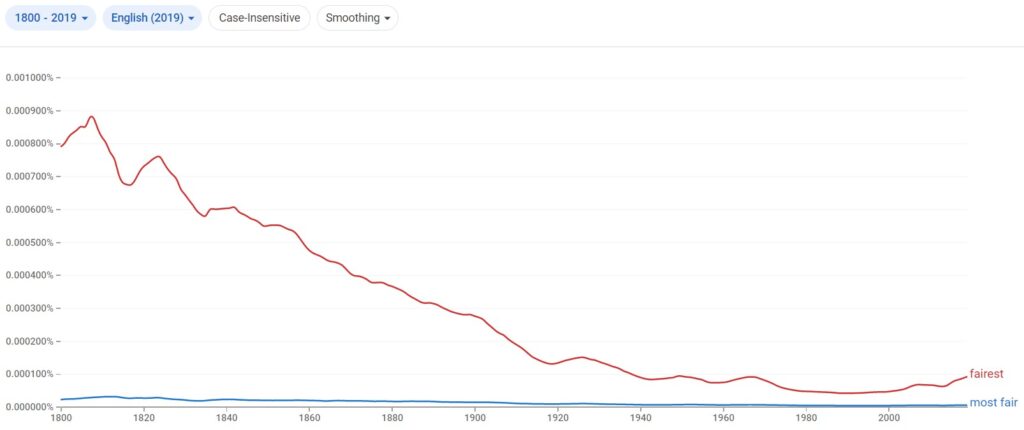
You may also like:
“Sincere” – Comparative and Superlative Forms Explained
Gentler or More Gentle – Comparative and Superlative Forms
“Well” – Comparative and Superlative Forms Explained

Martin holds a Master’s degree in Finance and International Business. He has six years of experience in professional communication with clients, executives, and colleagues. Furthermore, he has teaching experience from Aarhus University. Martin has been featured as an expert in communication and teaching on Forbes and Shopify. Read more about Martin here.
